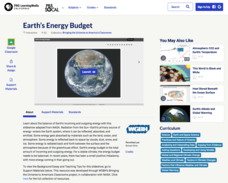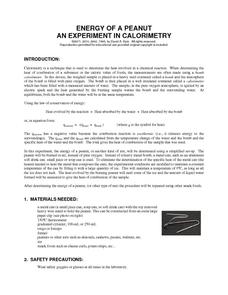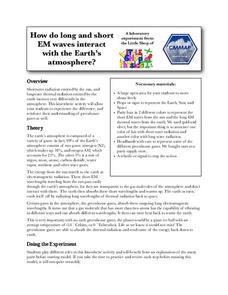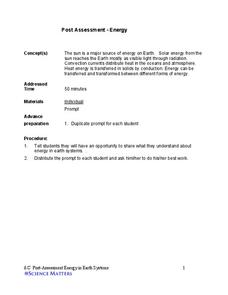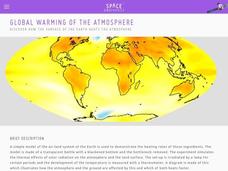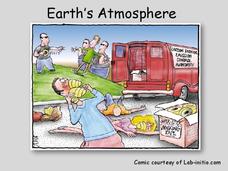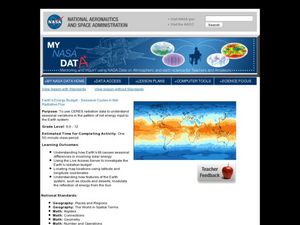NASA
Earth's Global Energy Budget
Introduce your earth science enthusiasts to the earth's energy budget. Teach them using an informative set of slides that include illuminating lecturer's notes, relevant vocabulary, embedded animations, colorful satellite maps, and a...
PBS
Earth’s Energy Budget
Is Earth's energy flow a little off balance? Explore our energy budget using a click-through interactive. Scholars discover the many factors that move solar energy around the planet and why the system is no longer in equilibrium.
National Wildlife Federation
I’ve Got the POWER! Solar Energy Potential at Your School
Should every school have solar panels? The 19th lesson in a series of 21 has scholars research the feasibility of using solar panels at their school. They begin by gathering data on the solar energy in the area before estimating the...
Curated OER
The Earth's Atmosphere and Temperature
Students describe and compare the layers of the atmosphere. They explain how to measure the temperature of the atmosphere and discover what causes the atmosphere to heat up in some places more than in others.
Curated OER
Atmospheric Chemistry
If you need a comprehensive review of the development of Earth's atmosphere through the ages, then this is for you! The presentation starts with a introduction to theories of planet formation and initial distribution of isotopes in the...
Baylor College
Pre-Assessment: Earth's Energy Sources
A ten-question, multiple-choice quiz assesses what your elementary earth scientists know about the atmosphere both before and after a unique unit on global atmospheric change. Make sure to check out the activities and lesson plans...
Curated OER
Producing Energy From Fossil Fuels and Renewable Sources
All types of energy are presented here, with neat pictures and labels to illustrate the technology typically used. Ways of harnessing the energy most efficiently are discussed, and good examples provide starters for further research....
Curated OER
Cycling of Matter and Energy
These twenty various types of questions related to the cycling of matter and energy require students to match each definition in column 1 with the correct vocabulary term from column 2. Then, students explain what is being demonstrated...
Chymist
Energy of a Peanut
Are you nuts? An engaging experiment burns nuts to find their kilocalories. Young chemists analyze at least two different types of nuts with their experimental results versus what is on the package. The resource offers a great lab...
Colorado State University
How Do Long and Short EM Waves Interact with the Earth's Atmosphere?
Things are about to heat up in your classroom! A kinesthetic lesson asks learners to play the part of the gases in the earth's atmosphere and interact with the sun's radiation. The focus is to learn the impact of the increasing...
Baylor College
Using Heat from the Sun
Let's heat things up! This simple experiment demonstrates for students the important role the sun plays in providing the earth with energy. Place one cup of water in direct sunlight and one in shade, then take measurements in order to...
Baylor College
People and Climate
Model how the sun's energy strikes the planet and help your class relate it to a climate map. Assign small groups an individual climate zone to discuss. They reflect on and research how humans survive in the assigned climate and write a...
Science Matters
Post-Assessment Energy
After nine lessons and activities about energy, here is the final assessment. The 20-questions include multiple choice, multiple choice with justification, short answer, answer analysis, and labeling diagrams to challenge learners.
Biology Junction
Energy Flow in an Ecosystem
Every living thing requires a food source, thus the interconnections in ecosystems become complex. Scholars learn about these interconnections in a presentation on energy flow. It starts with the sun and moves through many different...
Space Awareness
Global Warming of the Atmosphere
Scientists know the amount of carbon dioxide in the atmosphere today is higher than at any point in the last 800,000 years. Scholars learn about the amount of thermic radiation absorbed by air and what happens to the rest of the...
Science Geek
Earth's Atmosphere
Ozone gas absorbs the harmful UV-B rays and helps protect humans. An informative presentation begins with the layers of the earth's atmosphere, the pressure and temperature in each of the layers, the ozone layer, the ozone cycle,...
Curated OER
Water, Oceans and Atmosphere
There are some really nice diagrams and facts regarding the atmosphere and regulation of energy levels in this PowerPoint. It would be wise to double-check some of the details, but these slides would provide a nice visual recap of...
Curated OER
Unit 1 Matter and Energy
Topping this worksheet is a comprehensive collection of notes about phase changes. The phase change graph is displayed, along with formulas for the gas laws, and information relating energy to change of phase. After reviewing these...
Curated OER
Earth's Energy Budget - Seasonal Cycles in Net Radiative Flux
Students attempt to understand seasonal variation by viewing images of the energy received by the earth. In this weather lesson, students view images from NASA of the influx of energy from the sun and make predictions about resulting...
Curated OER
Relative Positions of the Earth, Moon, and Sun Over Time
Teacher pages for four different activities and three assessments are provided in this resource. Topics deal with how the sun's position and Earth's atmosphere affect the amount of solar energy reaching Earth's surface. The concepts and...
Curated OER
Incoming Solar Radiation
Demonstrate how the spherical shape of the Earth contributes to unequal heating of its surface and results in varying climates at different latitudes. This would be an illuminating addition to your meteorology lessons, especially when...
US Department of Energy
Sunlight and Evaporation
Here is a simple inquiry experiment designed to demonstrate that the energy from sunlight can evaporate water. Young scientists follow provided procedural steps to construct a model of our atmosphere using a bowl, a cup, water and...
University of Texas
Heat Transfer and Energy Balance
Learn about conduction, convection, and radiation with an illustrative presentation. It includes slides about atmospheric movement and how it affects the climate, solar radiation, and how latent heat can form storms.
Mr. E. Science
Atmosphere
Earth's atmosphere is full of different energies, from thermal to wind to electromagnetic radiation. Through the presentation, class members discover these energies and how they determine weather patterns.
Other popular searches
- Energy in the Atmosphere
- Energy Earth's Atmosphere
- Energy in Earth's Atmosphere
- Energy Transfer in Atmosphere

